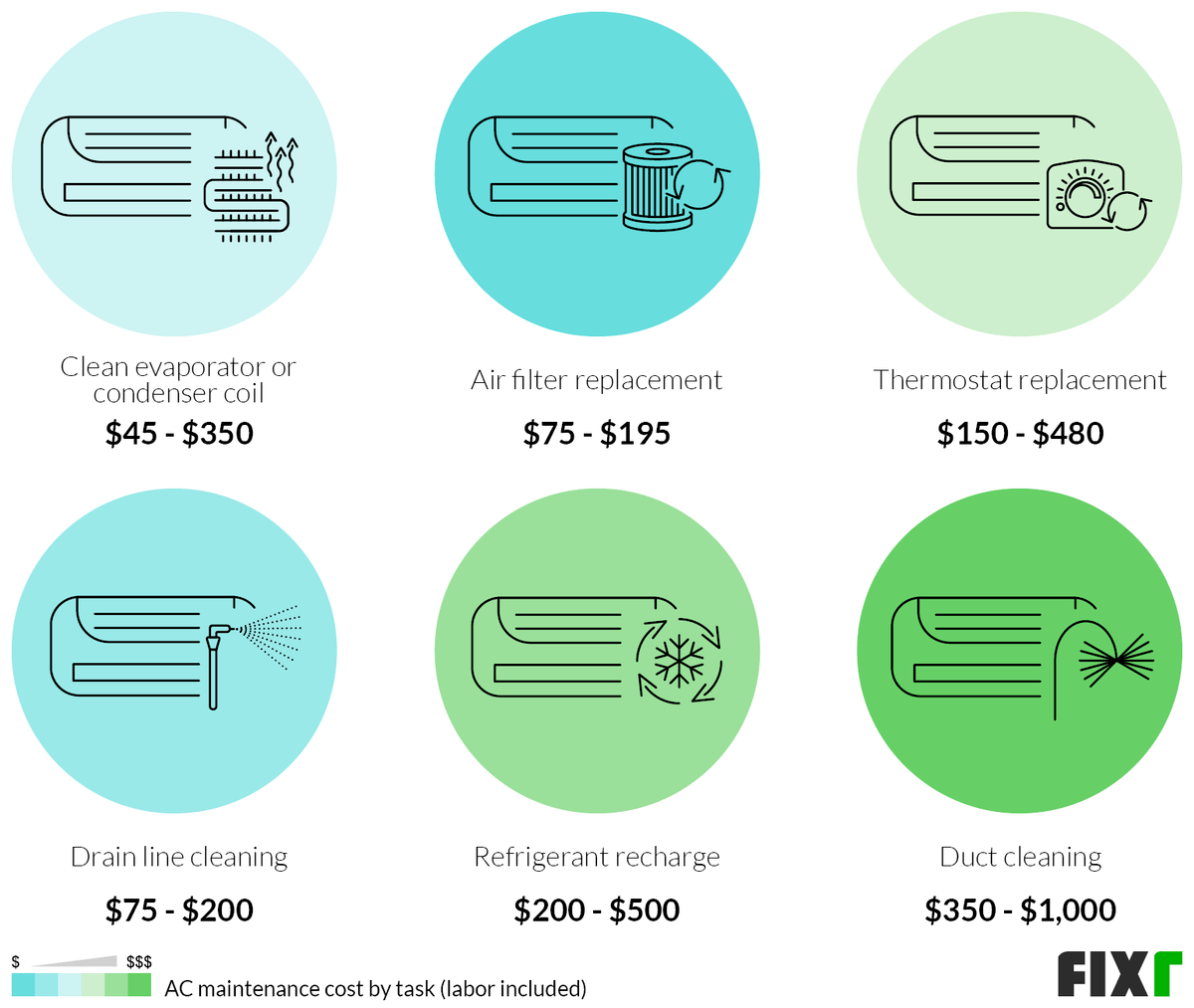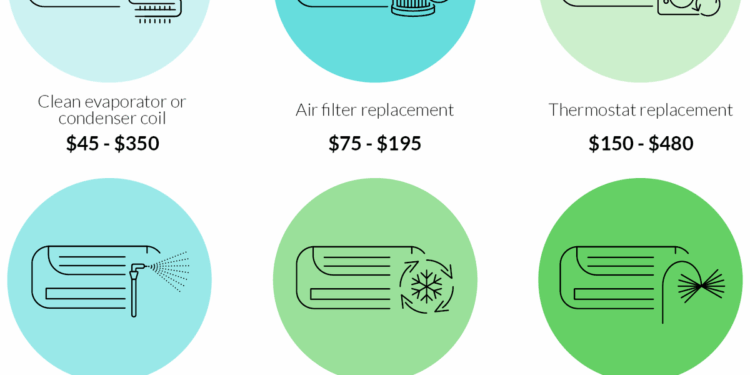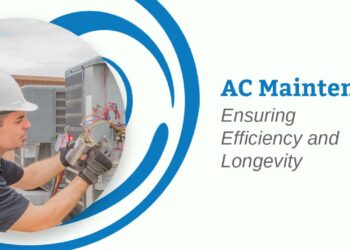
Delve into the realm of AC maintenance costs, where every decision can impact your wallet. From understanding the factors that drive costs to exploring cost-saving tips, this guide is your roadmap to efficient maintenance practices.
As we navigate through the intricacies of AC maintenance costs, you'll uncover valuable insights to keep your unit running smoothly without breaking the bank.
Factors affecting AC maintenance cost
Several factors can influence the cost of maintaining an air conditioning unit. Understanding these factors is crucial for budgeting and planning purposes.
Age of the AC Unit
The age of the AC unit plays a significant role in determining maintenance costs. Older units may require more frequent repairs and replacement parts, which can add up over time.
Frequency of Use
The frequency of use also impacts maintenance costs. Units that are used more often are subject to more wear and tear, leading to a higher likelihood of breakdowns and the need for repairs.
Maintenance History
The maintenance history of the AC unit is crucial. Regular maintenance can help prevent costly repairs by identifying and addressing issues early on. Neglecting maintenance can result in more significant problems down the line.
Poor Installation and Lack of Regular Maintenance
Poor installation or lack of regular maintenance can lead to higher maintenance costs. Improper installation can cause the unit to work harder, leading to more wear and tear. Neglecting regular maintenance can result in a decrease in efficiency, increasing energy consumption and costs.
Energy Efficiency Ratings
The energy efficiency rating of an AC unit can impact long-term maintenance expenses. Units with higher energy efficiency ratings tend to require less maintenance and have lower operating costs. Investing in a more energy-efficient unit upfront can lead to savings in the long run.
Types of maintenance required for AC units
Regular maintenance is crucial for ensuring that your AC unit operates efficiently and lasts longer. Here are the different types of maintenance tasks essential for keeping your AC unit in good working condition:
Routine Maintenance Tasks
- Filter Replacement: Regularly changing the air filter is essential to ensure proper airflow and prevent dust and debris from accumulating in the system.
- Cleaning: Cleaning the condenser coils, evaporator coils, and fins helps improve efficiency and cooling performance.
- Checking Refrigerant Levels: Ensuring that the refrigerant levels are adequate helps maintain optimal cooling and prevents damage to the system.
Complex Repair and Maintenance
- Electrical Component Inspection: Checking and replacing faulty electrical components like capacitors, contactors, and wiring is crucial for preventing breakdowns.
- Leak Detection and Repair: Identifying and fixing refrigerant leaks is essential for maintaining the cooling capacity of the AC unit.
- Compressor Maintenance: Regular inspection and lubrication of the compressor can help prevent costly repairs and extend the lifespan of the unit.
Signs that indicate the need for professional maintenance services
- Weak Airflow: If you notice weak or inconsistent airflow from the vents, it may indicate a clogged filter or ductwork that needs cleaning.
- Strange Noises: Unusual sounds like grinding, squealing, or banging noises could signal mechanical issues that require professional attention.
- Increased Energy Bills: A sudden spike in energy bills without a change in usage patterns could indicate that your AC unit is not operating efficiently
.
Cost-saving tips for AC maintenance
Regular maintenance of your AC unit is essential to ensure optimal performance and extend its lifespan. By following these cost-saving tips, you can keep your AC running efficiently without breaking the bank.
Regular DIY Maintenance Tasks
Performing simple maintenance tasks on your AC unit can help prevent major issues and reduce overall maintenance costs. Some DIY tasks include:
- Cleaning or replacing the air filters regularly to improve airflow and efficiency.
- Ensuring the outdoor unit is free from debris and vegetation to maintain proper airflow.
- Checking and cleaning the evaporator and condenser coils to prevent overheating and system breakdowns.
- Inspecting and cleaning the drainage system to prevent water leaks and damage.
Scheduling Annual Maintenance Checks
Regular annual maintenance checks by a professional HVAC technician can help identify and address minor issues before they escalate into costly repairs. These maintenance checks can include:
- Inspecting and adjusting refrigerant levels to ensure optimal cooling efficiency.
- Tightening electrical connections and lubricating moving parts to reduce wear and tear.
- Checking for leaks and ensuring all components are functioning properly.
- Calibrating the thermostat for accurate temperature control.
By investing in regular maintenance and performing DIY tasks, you can save money on AC repairs and utility bills in the long run while ensuring your unit operates efficiently throughout its lifespan.
Comparison of AC maintenance costs for different types of units
When it comes to AC maintenance costs, the type of unit you have can significantly impact how much you'll need to spend over time. Let's compare the maintenance costs associated with various types of AC units and understand which ones generally require higher expenditures.
Maintenance Costs by Type of Unit
- Window Units: Window AC units typically have lower maintenance costs compared to other types. They are simpler in design and easier to maintain, often requiring basic cleaning and filter replacements.
- Split Systems: Split system AC units, which consist of an indoor and outdoor unit, may have moderate maintenance costs. Regular cleaning of both units and occasional servicing can help keep these systems running efficiently.
- Central AC: Central AC systems tend to have higher maintenance costs due to their size and complexity. Routine inspections, cleaning of ductwork, and servicing of the entire system are essential to ensure optimal performance.
- Ductless Mini-Split Systems: Ductless mini-split systems fall somewhere between split systems and central AC in terms of maintenance costs. While they are easier to install and maintain than central AC, they still require regular cleaning and servicing to function properly.
Impact of Size and Complexity
The size and complexity of the AC system can also influence maintenance costs. Larger systems with more components and intricate designs typically require more thorough maintenance, leading to higher expenses. Conversely, smaller units with simpler setups may have lower maintenance costs but still need regular care to prevent issues.
Last Point
In conclusion, managing AC maintenance costs is not just about expenses—it's about ensuring your comfort and peace of mind. By implementing the strategies discussed, you can strike a balance between cost-effectiveness and optimal performance for your AC unit.
Questions Often Asked
What factors influence AC maintenance costs?
Factors such as age of the AC unit, frequency of use, and maintenance history can impact maintenance costs significantly.
How can regular DIY maintenance tasks help reduce overall expenses?
Performing routine tasks like cleaning or replacing filters can prevent major issues, lowering your maintenance expenses in the long run.
Which type of AC unit generally requires higher maintenance expenditures?
Complex systems like central AC units may require higher maintenance costs compared to simpler units like window ACs.
 Delve into the realm of AC maintenance costs, where every decision can impact your wallet. From understanding the factors that drive costs to exploring cost-saving tips, this guide is your roadmap to efficient maintenance practices.
As we navigate through the intricacies of AC maintenance costs, you'll uncover valuable insights to keep your unit running smoothly without breaking the bank.
Delve into the realm of AC maintenance costs, where every decision can impact your wallet. From understanding the factors that drive costs to exploring cost-saving tips, this guide is your roadmap to efficient maintenance practices.
As we navigate through the intricacies of AC maintenance costs, you'll uncover valuable insights to keep your unit running smoothly without breaking the bank.












